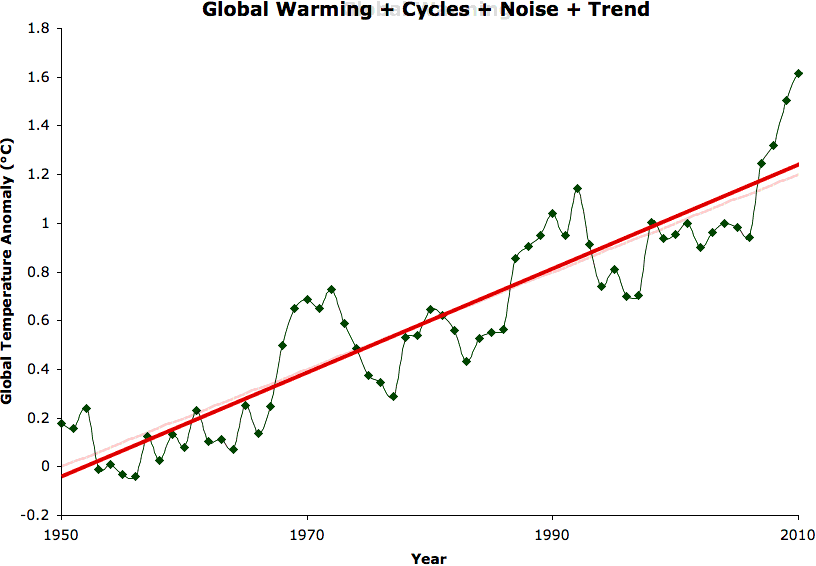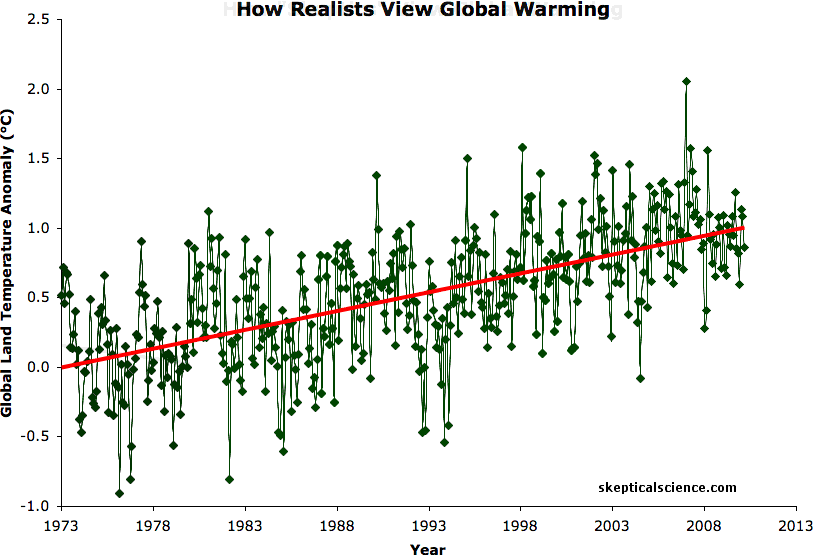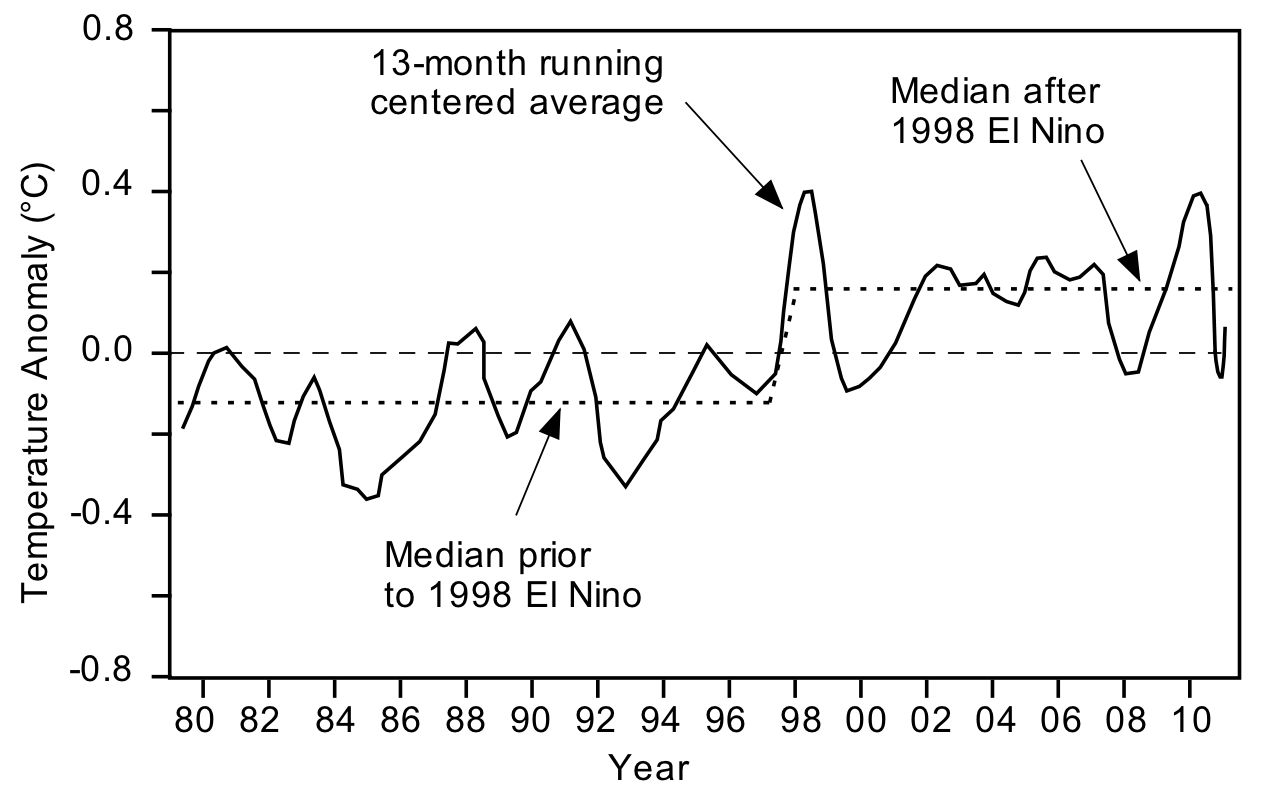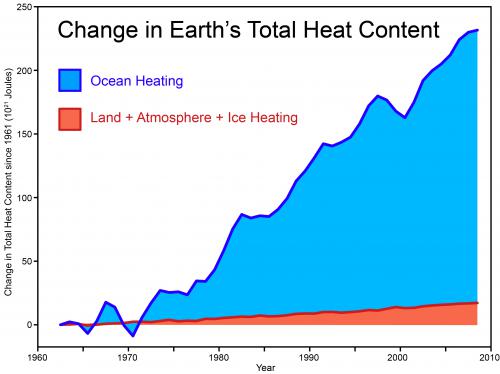Going Down the Up Escalator, Part 2
Posted on 8 November 2011 by dana1981
As we discussed in Going Down the Up Escalator, Part 1, it's a very common mistake - even amongst some climate scientists - to confuse short-term climate noise with long-term global warming signal. Our very popular Figure 1 below illustrates this confusion very nicely:
Figure 1: BEST land-only surface temperature data (green) with linear trends applied to the timeframes 1973 to 1980, 1980 to 1988, 1988 to 1995, 1995 to 2001, 1998 to 2005, 2002 to 2010 (blue), and 1973 to 2010 (red). Created by Dana Nuccitelli. Hat-tip to Skeptical Science contributor Sphaerica for identifying all of these "cooling trends." (Figure 1 has been added to the SkS Climate Graphics Page).
Some climate "skeptics" have suggested explanations as to why their interpretation of global warming shown in Figure 1 is actually the correct one. We will examine those explanations in this post.
Step Functions
Guest poster Jens Raunsø Jensen on WUWT created a very similar graphic to Figure 1, trying to argue that global warming can be modeled with step functions rather than a linear trend.
Figure 2: Jensen's plot of Denmark and global surface temperature, modeled as step functions triggered by Pacific Decadal Oscillation (PDO) shifts and El Niño events
On Judith Curry's blog, "skeptic" Donald Rapp makes much the same argument:
"Thorne et al. (2011) seemed not to be able to recognize the obvious fact shown in Figure 1 that tropospheric temperatures made a step function rise after the great El Niño of 1998 and was fairly constant before and after."
Figure 3: Donald Rapp's tropospheric temperature "step function"
Note by the way that each "skeptic" analysis relies on either HadCRUT or UAH/RSS temperature data, which are either known to or very possibly have a cool bias.
Roger Pielke Sr. echoes a similar argument from David Douglass on his blog (you may be noticing a similar cast of characters as in Part 1; Roy Spencer has also tried to blame global warming on oceanic cycles).
"[Douglass] would have “shouted” that calculating trends across a climate shift has no meaning."
A "Climate Shift"?
This concept of a short-term "climate shift" may come from Tsonis et al. 2007 and Swanson and Tsonis 2009, whose work John Cook has previously discussed. In short, Swanson and Tsonis hypothesized that when various natural oceanic cycles (PDO, AMO, etc.) synchronize (i.e. in their positive or negative phases), they can cause a short-term warming or cooling which could be described as a "climate regime shift."
As John discussed in his post, there are some issues with this hypothesis (i.e. we know observed forcings like solar irradiance and aerosols can explain most past short-term temperature changes without requiring major contributions from these "climate shifts"). But more importantly, as Swanson and Tsonis put it, these shifts are superimposed on an anthropogenic warming trend. As Swanson himself put it,
"What do our results have to do with Global Warming, i.e., the century-scale response to greenhouse gas emissions? VERY LITTLE, contrary to claims that others have made on our behalf."
Further, Swanson 2009 discussed that if climate is more sensitive to internal variability than currently thought, this would also mean climate is more sensitive to imposed forcings, which means that we would still expect CO2 and other anthropogenic forcings to cause substantial warming.
Creating Our Own "Climate Shifts"
We can very easily demonstrate the fundamental flaw in this "climate shifts" argument by creating our own simulated temperature data. Figure 4 shows the following panels:
- A 0.2°C per decade global warming trend
- Two 'natural cycles' (cosine functions) both with 0.15°C amplitude and periods of 10 and 20 years, respectively
- Random noise with 0.07°C amplitude
- The sum of the warming trend, cycles, and noise
- The sum fit with a step function with three steps: linear trends from 1950 to 1963, 1967 to 1986, and 1987 to 2003 (light blue)
- The sum with a linear trend fit from 1950 to 2010. The linear trend (0.21°C per decade) is almost identical to the global warming signal (0.2°C per decade)

Figure 4: Simulated temperature data with a global warming signal (0.2°C/decade), natural cycles of 10 and 20 years, random noise, and the sum fit by a step function (blue and black) and a linear trend (red). Created by Dana Nuccitelli.
The point here is of course that while natural cycles superimposed on a linear global warming trend can be fit with a step function, the global warming is entirely caused by the linear trend (the radiative forcing, in the real world). The natural cycles have zero long-term trend and thus while they contribute to short-term temperature changes, contribute nothing to the long-term global warming.
Thus the "skeptic" conclusion that the step function is the appropriate model, and that natural cycles are what's causing global warming, is simply physically wrong.
Physical Reality
The Achilles Heel of the "climate shifts are causing global warming" hypothesis is that it's simply not a physical argument, for several reasons.
1. Why would the average global temperature jump to a new warmer state after an El Niño or positive PDO, but not drop back down to its cooler state after a La Niña or negative PDO, for example? If the "skeptic" climate shift argument is correct, the planet will continue to warm indefinitely.
2. Oceanic cycles don't create or retain heat, they simply move it around. So if these climate shifts are causing the surface air to warm, they should also be causing the oceans to cool. That simply is not the case. The oceans, surface, and troposphere are all warming because the Earth's total heat content is increasing (Figure 5).
Figure 5: Total Global Heat Content (data from Church et al 2011). Created by John Cook.
3. The reason global heat content is increasing is that there is a global energy imbalance caused primarily by the anthropogenic greenhouse gas forcing. Arguing that the warming is caused by a "climate shift" ignores the physical reality that this forcing and energy imbalance must result in global warming. Not coincidentally, there is a strong correlation between the temperature and greenhouse gas forcing increases (Figure 6).
Figure 6: BEST land-only surface tempeature (yellow, left axis) vs. greenhouse gas radiative forcing (black, right axis). Created by Robert Way.
The bottom line here is that climate "skeptics" need to stop looking for excuses to use short-term noise to argue that global warming has stopped. It hasn't, and it won't until we get the radiative forcing in Figure 6 under control, which won't happen until we get our greenhouse gas emissions under control. That's simply physical reality, and denying physical reality won't change it.
The George Santayana quote "Those who cannot remember the past are condemned to repeat it" comes to mind. Climate "skeptics" keep arguing that the anthropogenic global warming theory is wrong by fitting trends to short-term data, and ignoring the underlying long-term trend. In each case their arguments have been proven demonstrably wrong, and yet they keep coming up with new variations on the same fundamentally flawed premise. All the while, the long-term global warming trend continues upward.
Note: this post is also the rebuttal to the myth "It's a climate shift step function caused by natural cycles"































 Arguments
Arguments



































[DB] "That 0.1°C is presented without error bars. If error bars were included, it may very well be that there was no heating at all and no change in heat content."
The paramount word in your phrase is "if". How about less unsupported assertion and actually reading all of the sources available instead of just a hand-picked few? From Church & White, the source for Fig 5.:
I would posit that if "skeptics" read more with the intent to understand than there would be less of a heightened clamor about "error bars"; really, that becomes a dead giveaway (as seen above).
[DB] "I see that the Church & White source you list shows the Greenland and Antarctic ice sheets contributing to sea level with the same sign."
Nice goalpost shift. At least you could acknowledge that you were wrong.
"Antarctica is projected to contribute negatively to sea level."
Based on what?
"It would follow that the current contribution must be negative as well."
Does not parse/your logic doesn't hold. Actually, Antarctic land ice is decreasing at an accelerating rate. Antarctic sea ice is neutral wrt sea level change.
"Who am I to believe?"
What does belief have to do with science? Formulating hypothesis', testing them to build an evidenciary chain strong enough to eventually form the basis for theory is the goal. Peer-reviewed science published in reputable journals are best. Assertions without evidence tend to get ignored. FYI.
But by all means, don't take my word on things. Look them up for yourself.
deniersrefuseniksscience-rejectionists are waving the white flag on "the globe isn't warming", "greenhouse gases can't effect temperatures" and "global warming is a good thing." They're down to claiming that everything we know is overwhelmed by mysterious, magical forces that we don't understand ("natural variability"), and therefore we can simply ignore what is happening, and what we do know, because the ship will right itself.[DB] One of the primary things to learn about this website is the need to be able to substantiate a postion. For example:
"Does CO2 effect temps, yes, but not as much as has been "decided" it does."
Based on what, exactly? Source citation, please.
"Considering that there other GHGs that have a bigger effect."
Again, what do you base this on? Source citation, please.
"some of it is quite iffy at best"
Which parts? There is actually quite little I find "iffy" but maybe that's just me.
"Does this mean i am a "true" beleiver now, no, i still see things different than him and you, but now with my eyes and ears open wider."
To be honest, it's not a question of what one "believes". Nor is it about "sides" or "tribes". It is about science. Observable, testable science that best explains what we can see and measure. It's not called climate beliefs nor climate faiths. It's called climate science.
Every post here at SkS contains links to the peer-reviewed, published research so that readers can check things out for themselves. So no one has to take things on faith here.
So please take the time to tell us where you got the ideas for your assertions I noted above. For they are not supported by the literature and the science.
Thanks for the rational and useful perspective.
So oft in theologic wars, The disputants, I ween,
Rail on in utter ignorance
Of what each other mean,
And prate about an Elephant
Not one of them has seen!
[DB] Hot-linked URL.
[DB] We are all well-aware of what you said. My purpose in posting what I did in response to you was to illustrate the fact that ample data - including the "skeptics" favorite toy: error bars & error data - exist extant of the graph depicted and also extant of the IPCC's summary. All that remains is for an interested individual to actually look for it, instead of carping about a graph's supposed lack of whatever-their-point-of-interest is.
If you cannot locate what you are looking for, asking politely without insinuations of conspiracy, fraud or malfeasance on the part of, well, anyone, works best.
Please make a greater effort to remain on-topic, also. Off-topic snipped.
[DB] Thank you for the kind words, but the brilliance is displayed daily by the regular participants here. I try to make my small contribution in my own particular...idiom.